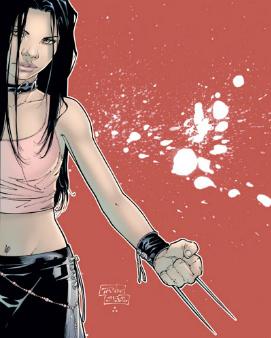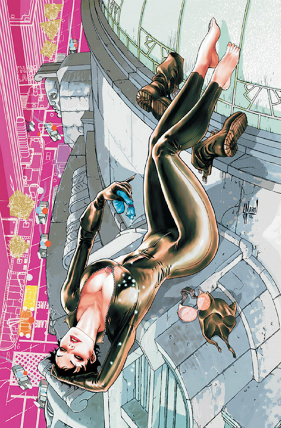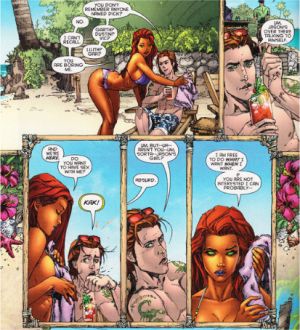Comics /
Comics News
X-23 Cancellation: Symptom or Issue?
By
Zak Edwards
November 16, 2011 - 20:44
First off, the following article owes a great debt to Kyle Phegley’s article “Marvel Comics Cancels X-23” over at comicbookresources.com, which I encourage all readers to take in. Consider this article cited!

|
Marvel has announced the cancellation of another series, X-23, as Disney’s inevitable restructuring sweeps through the publisher and seeks to increase profits, or, as Editor-in-Chief Axel Alonso puts it, “new budgetary mandates.” The interesting thing about this cancellation, however, is it is in contrast to the other cancellations thus far. Books like Alpha Flight and the preemptively canceled Dr. Doom series were all fringe or miniseries titles and not ongoing series. Unfortunately, this cancellation goes even further in a disturbing way: it’s the only ongoing title with a female lead in Marvel Comics’ line-up. And X-23 isn’t exactly the lowest selling book in any capacity either, with other ongoing titles faring worse than it anyways. It didn’t break the top 100 titles in October and just snuck in at #99 in September, but it also beat out other titles like X-Factor, Avengers Academy, and Thunderbolts.
So my questions are these: Why cancel X-23? What does this say about Marvel Comics and their readership, especially compared to the new DC universe launched a couple of months ago? and is this, dare I say it, a feminist or gendered concern?
X-23 may have been canceled simply because it doesn’t have a long-term plan that can interact with other, more popular and event-driven aspects of Marvel Comics. Marvel has been on an event-driven mandate for years now, from Avengers Disassembled to Civil War and, most recently, Fear Itself and the X-Men titles’ own Schism event. X-23, however, doesn’t seem to be interacting with these titles very directly, instead remaining fairly self-contained relative to, say, Thunderbolts, which had Fear Itself direct crossover stories (and banners across the top that broadcast as much). The potential for this series, much like a television show, is depreciating, getting less and less readers as it goes along. There certainly isn’t an excessive amount of press coverage on it in any regular capacity either. Many websites, including this one, haven’t been following it in a similar capacity to some of these other, more event focused, titles. However, the cynic in me is forced to look at this from another angle: mostly a readership and gender perspective.

|
Let’s consider the new DCU and the 52 relaunched, rebooted titles every comic book fan has been bombarded with for at least five months. There are six, arguably seven, ongoing series featuring female leads: Batgirl, Batwoman, Supergirl, Wonder Woman, Catwoman, Voodoo, and Birds of Prey (that’s more a team book comprised of a primarily female cast, so it’s the ‘arguably’). They are all selling well, ranking mostly in the top 50 comics sold in October; although, being the reboot, these numbers will probably fall in the coming months as attention moves onto other things. Coupled with the past examples of how these books can be critically acclaimed works two things seem immediately apparent at first glance: there is a market and readership for female led books and these titles have a certain amount of viability, both artistically and fiscally. Of course, the DC characters are much more established than X-23, characters like Wonder Woman and Catwoman, and books like Birds of Prey are all deeper in the public consciousness and have had popular stories told using these characters for many years. So why is Marvel enacting what appears to be a fairly sexist cancellation? There are books performing more poorly than X-23’s and they are kept around. And is DC Comics ‘doing’ female-centric comics better?
DC has been receiving what I believe to be a reasonable amount of attention in their approach to female characters. Books like Catwoman and Red Hood and the Outlaws are, in my mind at least, extremely problematic approaches to female characters specifically constructed for a specific male readership and many people have been trying to figure these books out by writing about them. Some of these analyses have been quite thought-provoking, others, in one instance, have taken the very public and somewhat ridiculous approach of getting a seven-year old child to give basic literary analysis and pass it off as an informed and relevant opinion. This sort of engagement follows the same logic of giving a child in grade four a copy of Grand Theft Auto and calling the game irresponsible. But others have been thinking things through. What these DC titles are suggesting, however, is that the publisher’s readership is content with reading and buying female led books, even if they are blatantly sexualized and problematic. Wonder Woman stands as an obvious statement against this, which is an important factor to consider so this doesn’t become a blanket statement, but Wonder Woman has traditionally been a feminist character and a book that takes these considerations into account. So while DC is putting out more female-centric books, and a couple are offering sensitive and critically acclaimed material, they are largely in title and character only, not in intended demographic or content. It would be easy to paint DC as the good guys based solely on solicitations, but I feel they are equally problematic in their approach to their female characters.

|
Marvel Comics, however, seems content having female characters as supporting cast members or part of a larger group, perhaps reflecting the stereotypically male-dominated audience. After all, these books are generally written for and by males. For their collective solicits for October, excluding external licensed properties and sister publishers, DC and Marvel Comics released a grand total of four books written by female writers, two of which are books with a female protagonist (Gail Simone’s Batgirl and G. Willow Wilson’s Mystic). All other books, including the aforementioned problematic ones, are instead written by male writers. In fact, the whole new DC, excluding Gail Simone’s Batgirl, is completely written by male writers. Yes, there are more female creators involved, including editors, artists, letterers, and colourists, but less than a handful of female writers. However, this isn’t to suggest that male writers cannot write or contribute to a feminist perspective. Azzarello’s Wonder Woman, I feel, is handling itself quite well, and Brian K. Vaughan and Brian Wood are two other writers also contributing to feminist discussions in comics, mainstream and otherwise. What I am suggesting is Marvel’s elimination of the last female led ongoing book written by a female writer argues that their female characters in their books need to be written, or at least supervised, by males. After all, now that there is only a single title, a mini-series almost wrapped up, written by a woman about female characters, every female in the Marvel Universe is under the direct supervision of male creators and characters, either as supporting cast members or part of an ensemble approach directly controlled by men. And while I disagree with a simplistic, men in dark rooms controlling women scenario, this is a situation that is extremely disconcerting, even if the characters and their stories are handled in well-constructed and sensitive ways.
So what does this cancellation represent? Well, mostly that comic readers are varied. Some want to engage with strong female characters, others want to watch them do things in sexualized manners, but Marvel’s recent actions and book selections suggest Marvel Comics would like to do this under the careful watch of male characters and creators. The problem, as always, is everyone’s, from the writers to the higher ups and the buying public, so while it would be easy to say this is an issue at Marvel, it’s really an issue with comics at large. The readership for both publishing houses are mostly demanding a single type of comic with a couple of (now increasingly) rare exceptions.
Last Updated: November 29, 2025 - 16:51




